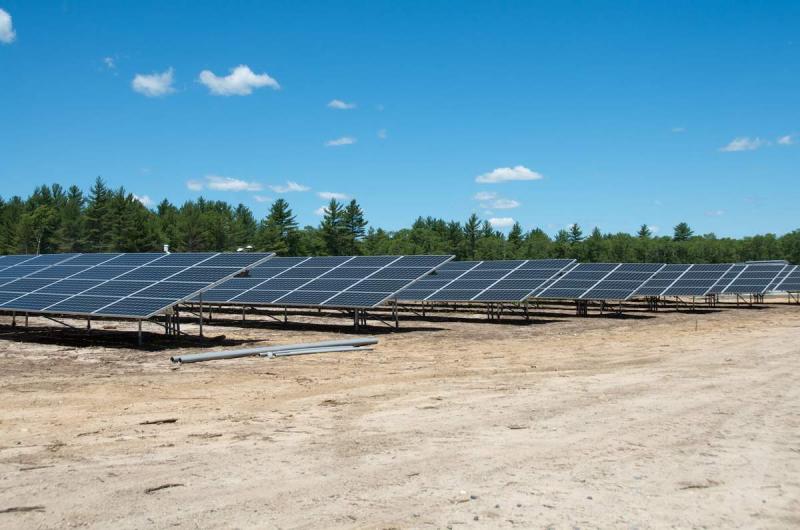Residents: solar farms will affect town's character
Opponents of a proposed solar farm at in Rochester are worried that the numerous solar farms built or proposed in the town will change the community's rural nature.
The concerns came to a head at the June 27 meeting of the Rochester Planning Board. A proposed solar installation at 453 Rounseville Road, near Rochester Center, came under close scrutiny by abutters and concerned citizens.
Borrego Solar is proposing to use a 67-acre lot on the property to erect 9,000 solar panels. The solar panel installation itself will cover 13 acres. The proposal also includes clearing 7 acres worth of trees to make room for a berm and 8' fence around the entirety of the property.
"If the panels don't start until 80' back from the road, why do you need to cut all the trees and put up a fence?" asked abutter Ward Benner, of 50 Mendell Road. "Keeping the trees would be more fitting with the character of Rochester."
Borrego Solar representative Steve Long explained that Rochester zoning bylaws required a solid screening fence around the perimeter; Planning Board Chair Arnie Johnson agreed.
"We also need the berm, and if we don't remove the trees, we can't put in a berm," Long pointed out.
Many of the residents were concerned in general with the proliferation of solar farms in town, and the inability of town officials to prohibit the installations.
Members of the Rochester Historical Commission noted that Rochester Center has been an agricultural center since before European settlement; the area had been cleared for Native American agriculture, which was why European farmers initially brought their cows there.
Many residents felt that the continuous inflow of solar farms requiring vigorous screening and fencing in of open land, would change the nature of a town still viewed as largely rural.
"Town bylaws state that projects will be done in consideration of the town character," said Kimberly Bindas, of 14 Mendell Road. "How does this project even fit in with that?"
"The answer is that solar farms have been given favored status by the state," explained Johnson. "It makes it very hard for the town to outright deny them. This a very pro-solar state."
He noted that the town had attempted to pass a bylaw two years ago which would only allow solar farms in Rochester's industrial district. However, he explained, Town Counsel Blair Bailey nixed the proposal.
"The Attorney General would never accept the bylaw, as so little of Rochester is zoned as 'industrial'. Effectively, the Attorney General would see it as us banning solar from Rochester altogether, and wouldn't accept that," Johnson explained.
Dale Bindas of 14 Mendell Road asked what would happen when the solar panels were no longer of use. "Who cleans them up? Will they just sit there and rot?"
"No," Johnson told him. "We require three bonds from solar companies when they come here. "One is a decommissioning bond, which covers complete removal of the site."
According to Long, the average lifespan of a solar panel is 20 to 25 years.
Other residents raised concerns of chemicals leaching into the groundwater.
"The solar companies can't use herbicides, pesticides or industrial cleaners," Johnson clarified.
Board member John DeMaggio noted that the current group of objectors were not the first into the meeting room. "We've seen others before with the same concerns. We've done a lot of research with the previous solar farms. There is no leaching or runoff. You could throw these panels into a pond and they wouldn't affect the water."
Johnson said he had seen a lot of fields disappear in the time that he has lived in Rochester. "I believe the state does discourage mass clearing of land," he said. "We are looking into that." He clarified that there was nothing definite from the state on that point.
Dale Bindas wasn't convinced at the town's inability to regulate the solar farms. "You have some input," he said, to which Johnson hesitantly agreed. "If solar farms keep moving in, you'll see people begin to move out."
"We can't do anything," said board member Ben Bailey. "I personally don't like it. I encourage you, or anyone, to get enough towns together to object to this government foolishness."













